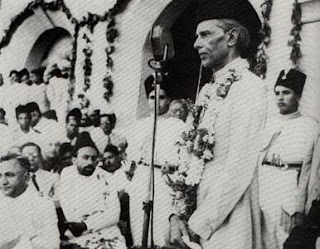 Jinnah delivering a political speech
Jinnah delivering a political speechJinnah felt, even as Tagore that Gandhi's doctrine of non-cooperation at best one of negation and despair and would not be able to reach the vital condition of Swaraj. Jinnah tried hard for Hindu-Muslim unity . One such effort was the formulation of of the Delhi Muslim Proposal in March, 1927.
 Participants of the Conference held in Delhi, 1927 :
Participants of the Conference held in Delhi, 1927 :Delhi Muslim Proposal, 1927 :
Considering separate electorates to be the main hindrance in improving Hindu-Muslim relations Quaid-i-Azam proposed that if the Hindus agreed to provide certain safegurds, the Muslims would give up this demand. Consequently, the proposals were formally approved at a conference held by the Muslims at Delhi in 1927 and were now called " Delhi-Muslim proposals". The following were the safegurds that were proposed:
1. The formation of a separate province at Sindh.
2. Itroduction of reforms in the North West Frontier Province and in Baluchistanon the same footing as in other provinces.
3. Unless and until the above proposals were implemented, the Muslims would never surrender the right of their representation through separate electorates with the reservation of seats fixed in proportion to the population of different communities, if the above two proposals were imlemented to the full satisfaction of Muslims and also if the following prposals were accepted.
4. Hindu minorities in Sindh , Baluchistan,and the NWFPbe accorded the same concessions in the form of reservation of seats over and above the proportion of their population as Muslims would get in Hindu majority provinces.
5. Muslim representation in the central Legislature would not be less than one-third.
6. Inadditions to provisions like religious freedom, there was to be a further guarantee in the constitution that on comunal matters no bill or resolution would be considered or passed if three-fourth of the members of the community concerned were opposed to it.
These proposals were to be accepted or rejected in toto.S, in effect, the Muslims agreed to give up the separate electorates in form of the reservation of seats . Unfortunately, the Congress first accepted but later rejected the proposals.This was to be noted that the Nehru (Motilal)report, 1928, had negated the minimum Muslim demands embodied in the Delhi Muslim Proposals.
Nehru Report,1928
Pandit Motilal Nehru:The Govt. of India Act 1919 was essentially transitional in character. Under section 84 of the said act, a statutory commission was to be appointedat the end of ten years to determine the nextstage in the reaalization of the self rule in India. Accordingly Simon Commission was sent to the Sub-continent under the command of Sir John Simon.All members of the commission were British.This was regarded as highly insulting to the Indians and immedtate protest was raised from all the important political parties. When the Simon Commission arrived, the local masses welcomed it by slogans "go back Simon". All the major political parties except the shafi League of Punjab, Boycotted the Simon Commision.Simon Commission was withdrawn and they asked to frame constitution by the local people. But after sitting about 100 conferences no results were obtained.
 Jinnah delivering a political speech
Jinnah delivering a political speech Participants of the Conference held in Delhi, 1927 :
Participants of the Conference held in Delhi, 1927 :